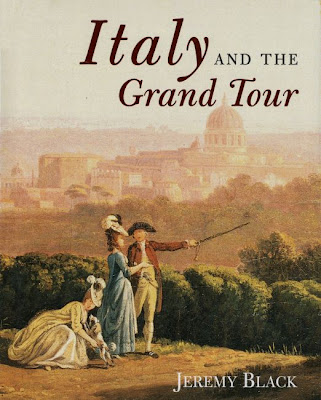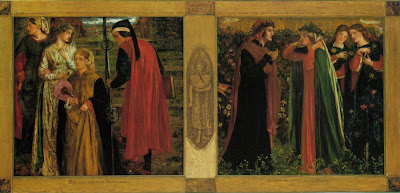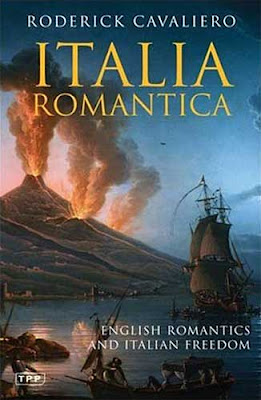Italy has held a significant place in the collective imagination of other European nations for centuries. In the Renaissance the reappraisal/rediscovery of classical antiquity included new translations of Greek and Latin texts and the excavation and study of classical material culture, especially that of the Romans. Italian Renaissance learning and the understanding of perspective in the visual arts filtered into the rest of Europe transforming intellectual and visual culture.
In the 18th C. what was known as the
"the Grand Tour" became a critical element in the
education of every young upper-class English gentlemen. Italy was at the center of this new cultural tourism. Chaperoned by a wiser,
older man (often
a tutor or trusted family retainer) the young man would set out to explore the high culture of cities, the private art and scientific collections of nobles and royal courts and the ruins of classical civilization. It was hoped that exposure to the picturesque landscape, the environment of classical traditions and the vitality of colorful, "less civilized" peoples of Europe, would quicken the traveler's intellect and turn him into a cultivated, worldly being.
Jeremy Black's book explores the Grand Tour, the British aristocracy and their relationship to Italy in great detail.

Two groups of Romantic artists who idolized and appropriated themes of Renaissance Italy are the
German Nazarenes and
English Preraphaelites. Johann Friedrich Overbeck (1789-1865) and
Dante Gabriel Rossetti (1828-1882) are representative painters of the two schools.
Christina Rossetti (1830-1894) (Dante G's sister) was a well-known poet.
 Italia and Germani, Johann Friedrich Overbeck, oil on canvas, 1815-1828, Neue Pinakothek, Munich
Italia and Germani, Johann Friedrich Overbeck, oil on canvas, 1815-1828, Neue Pinakothek, Munich
Here the spirits of the two peoples are personified as Renaissance women (they actually had earlier identites as characters in a novel). Notice the architecture in the background, the plants making up the women's wreaths, and their facial features- all signs to point out (sum up) the "natures" of the two peoples. Who seems to be dominating this conversation? What do you think this imagined conversation between the two personified nations is about?
 The Salutation of Beatrice, Dante Gabriel Rossetti, oil on panels, 1859, National Gallery of Canada, Ottawa
The Salutation of Beatrice, Dante Gabriel Rossetti, oil on panels, 1859, National Gallery of Canada, Ottawa
Rossetti created numerous paintings of his namesake the great Renaissance poet Dante Alighieri and that poet's great love the noblewoman Beatrice Portinari. This was a chaste love that would fuel the poet's imagination. Beatrice as Muse and as spiritual teacher would be central to Dante's greatest achievement The Divine Comedy.
Renaissance and Enlightenment intellectuals had imagined Greece and Rome as the fountain-head of artistic genius, using ancient aesthetics as the measuring stick for art, poetry, drama and architecture. The Romantics looked to the Renaissance, especially the early Renaissance, as inspiration for their own creative output. The Renaissance poets Petrarch and Dante became touchstones for those Romantics interested in recapturing the spirit and inspiration which they saw as having reached a zenith in a premodern (early modern?) Italy
 Dante and Beatrice, Henry Holiday, 1883, oil on canvas,
Dante and Beatrice, Henry Holiday, 1883, oil on canvas, National Museums and Galleries on Merseyside, Liverpool. Dante and Beatrice Behold the Beatific Vision, Gustave Dore, 1867, etching (illustration for The Divine Comedy)See this and many of Dore's other amazing illustrations here
Dante and Beatrice Behold the Beatific Vision, Gustave Dore, 1867, etching (illustration for The Divine Comedy)See this and many of Dore's other amazing illustrations hereRoderick Cavaliero's book
Italia Romantica, explores the relationship between Italian independence in the 19th C. and the English Romantic imagination. Like the Romantic poet Lord Byron (who had died after going off to fight the Turks for Greek independence in 1824), other poets and artists became obsessed with Italy as a vehicle for their own pre-conceived notions about liberty, nationhood and artistic passions.

Overview from Google Books: "
In the eyes of the English Romantics, Italy was not a nation but "Italia," a place inhabited by the ancient. Theirs was a view shaped by the eighteenth century, the age of the Grand Tour, when no future nobleman's education was complete without a visit to Venice's carnival, the majestic ruins of the Forum in Rome, or the legendary Mount Vesuvius. Italia Romantica is a vivid history of the English Romantics' love affair with Italy. Through the eyes of Romantic travellers and poets such as Byron, Keats and Shelley, a fascinating picture of pre-unification Italy emerges, struggling to recover after Napoleon and edging towards the Risorgimento. Here is the Italy of idealized antiquity, magnificent but crumbling, somewhat like a gigantic and rather run-down living museum. It is full of bandits, unreformed Catholicism, vignettes of urban and pastoral life, of memorable characters and anecdote." http://recoveredaura.blogspot.co.uk/2010/02/be-italian-even-if-youre-really-german.html 
 The Salutation of Beatrice, Dante Gabriel Rossetti, oil on panels, 1859, National Gallery of Canada, Ottawa
The Salutation of Beatrice, Dante Gabriel Rossetti, oil on panels, 1859, National Gallery of Canada, Ottawa
 Overview from Google Books: "In the eyes of the English Romantics, Italy was not a nation but "Italia," a place inhabited by the ancient. Theirs was a view shaped by the eighteenth century, the age of the Grand Tour, when no future nobleman's education was complete without a visit to Venice's carnival, the majestic ruins of the Forum in Rome, or the legendary Mount Vesuvius. Italia Romantica is a vivid history of the English Romantics' love affair with Italy. Through the eyes of Romantic travellers and poets such as Byron, Keats and Shelley, a fascinating picture of pre-unification Italy emerges, struggling to recover after Napoleon and edging towards the Risorgimento. Here is the Italy of idealized antiquity, magnificent but crumbling, somewhat like a gigantic and rather run-down living museum. It is full of bandits, unreformed Catholicism, vignettes of urban and pastoral life, of memorable characters and anecdote."
Overview from Google Books: "In the eyes of the English Romantics, Italy was not a nation but "Italia," a place inhabited by the ancient. Theirs was a view shaped by the eighteenth century, the age of the Grand Tour, when no future nobleman's education was complete without a visit to Venice's carnival, the majestic ruins of the Forum in Rome, or the legendary Mount Vesuvius. Italia Romantica is a vivid history of the English Romantics' love affair with Italy. Through the eyes of Romantic travellers and poets such as Byron, Keats and Shelley, a fascinating picture of pre-unification Italy emerges, struggling to recover after Napoleon and edging towards the Risorgimento. Here is the Italy of idealized antiquity, magnificent but crumbling, somewhat like a gigantic and rather run-down living museum. It is full of bandits, unreformed Catholicism, vignettes of urban and pastoral life, of memorable characters and anecdote." 





